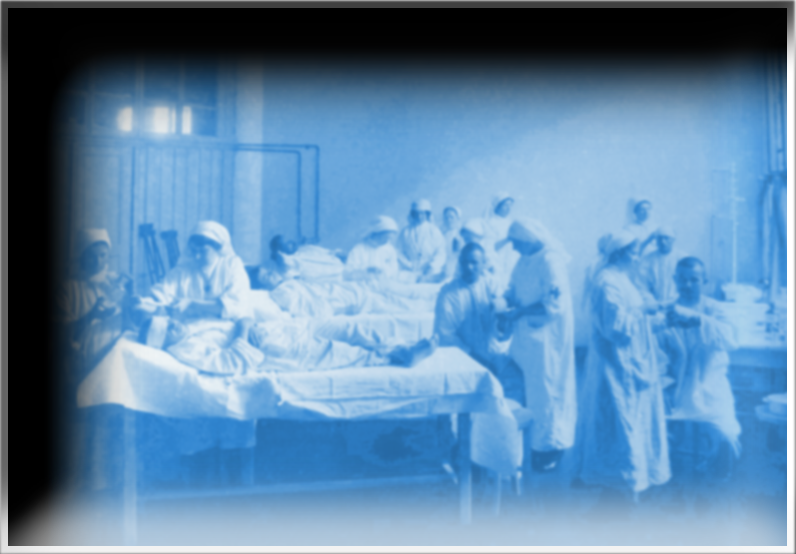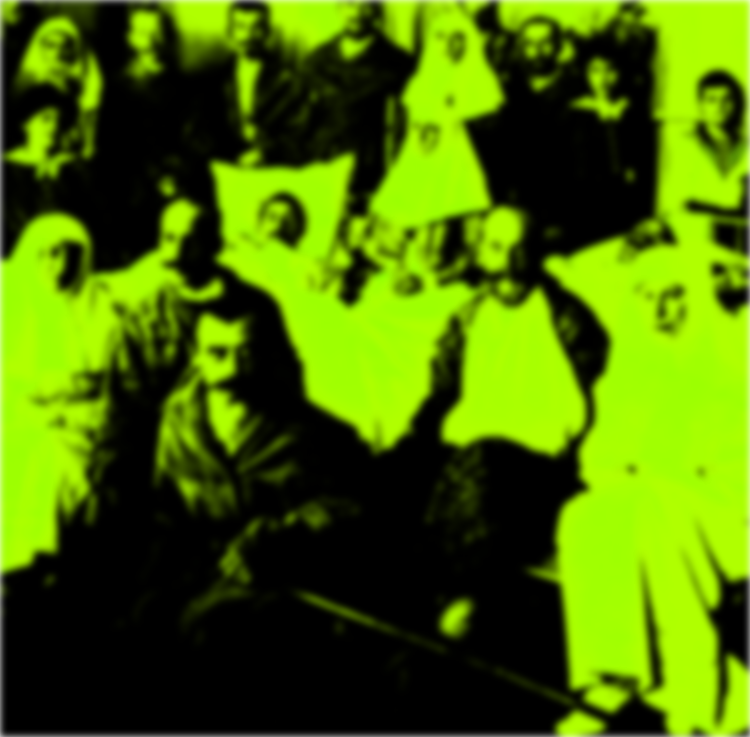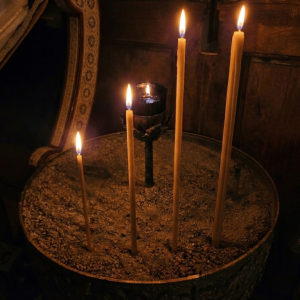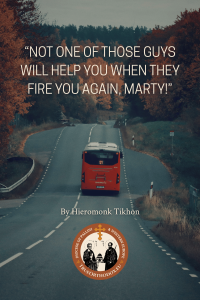How Chanting Should Lead Us Into the Next Life.

OUR FATHER
in the winter of 1916, the Kiev mobile hospital in which | was working as a nurse was located at Dvinsk.
On one of the hardest days of fighting toward evening, a group of wounded was brought in. Being the nurse on duty, I received them. I had to undress and wash them. The doctor, standing with his notebook, entered the new-arrivals and assigned them to the wards. I was on my knees in front of the last stretcher, all flushed with the effort, cutting off with a huge pair of scissors the boots of a soldier with a very young, terribly thin. pale face. He was unconscious.
“What is his name?” the doctor asked the nurse who was running through the wounded man’s papers.
“Wounded when?”
“Not marked here,” answered the nurse. “ALU right. Well leave it blank,” said the doctor, bending over the stretcher and attentively examining the wounded man, the soles of whose feet had turned black. “Carry him into the operating room and warn the senior doctor,” said he abruptly, as he finished his entry.
In an hour they had taken off both of Ivan’s legs up to the knee. The senior doctor, who performed the operation, was not at all pleased. “Gangrene has gone far up; his physique is weak and terribly exhausted. He will hardly come through!” He nodded his head, telling me to take Ivan to my ward and to give him at once a saline infusion.
After the infusion the deathly pale face of the sick man livened up a little, his breathing became more even, his pulse got stronger, but only on the following day, Ivan regained consciousness. I was in the ward when I heard a weak voice from the corner, “Something to drink!” That was Ivan coming to.
I got up quickly and went to him.
All flushed, he looked at me with his feverish, shining, blue eyes.
“Undoubtedly his temperature has gone up,” I thought, as I put my hand on his burning forehead. Then I carefully raised his head and gave him a drink.
“How do you feel?”
“Badly,” he said, as he took several swallows of tea with wine, barely moving his lips, which were cracked with heat, and again he dozed off.
Just at that moment, the senior doctor came into the ward.
“Well, how’s the new one?” he asked anxiously.
“How are you, young fellow?” asked Alexander Michailovich, coming up to him and taking his hand.
“It must be, I’ll have to die… everything hurts inside.”
“Inside, that’s nothing. But your legs, there, are bad. When were you wounded?”
“I? When we were attacking … I was a scout… on the 5th at night… we put on our kits and crawled,” he began to relate with difficulty, making frequent, long pauses. “I… Yegoroff and Trophim Speevak … We cut the wire, crawled ahead to look, how many… And then, he the German, began… We backed… and he fired more… I noticed, Yegoroff nowhere… I looked around … he was lying under a hillock. We were from the same place… I crawled back to him… Hold onto me, I said… I got a rope around him… and was dragging, then the German hit me, too… I stopped, lay there, like this… until… must have been at night … they dragged me out, too, with ropes,” he ended his story in a weak, as it were, apologetic voice, without giving any significance to his exploit.
“So you lay there under the hillock for five days!? Why didn’t they drag you out before?”
“Probably, Your Excellency, they couldn’t get up!” answered Ivan, again closing his eyes.
“That’s why he’s all frozen!” said the doctor thoughtfully, counting his pulse.
“Five days he lay there,” passed around the ward in a whisper.
The next day Ivan seemed better and felt more like talking. “It used to like to sing in the choir in the village. If there was any kind of a service I would always sing.”
“Sing us something gay,” wounded men asked him.

“I… I can’t. But at home, in the choir…”
What a pleasure it was for him to remember his village and his singing in his own church!
“What voice did you have? How did you sing?” I asked him.
“Not a strong voice… My voice was nothing special, but everybody listened.”
“Could you dance?” asked his neighbor, Simanchuk, who had become interested.
“After a fashion… only Yegoroff better. He could spin around like a wheel,” he answered more indifferently.
“I could like a wheel, too,” said Nikolai with an amputated leg. “I was first in the village.”
“Are you married?” a Tartar, who had been lying there silent until now, broke the silence which was about to settle down on the ward.
“No… how could I? I am only 19,” answered Ivan in a tired voice, with difficulty drawing the blanket over himself.
Ivan was not destined to recover. Blood poisoning set in. In the daytime his temperature was not much, but toward evening it went up terribly. He began to talk less. At first, the stories of his neighbors seemed to interest him, then he lay more and more with his eyes closed not interested in anything.
I felt awfully sorry for him. He was a modest and exceptionally patient soldier. “I’m not a woman, I ought not to show pain,” he would say, when I marveled at his endurance during the dressings. He had the commonest peasant face, but I, like every visitor to the ward, was involuntarily drawn to him, A somewhat melancholy, unworldly thoughtfulness, which had come over him while he lay on the field, was seen in his blue eyes.
What had he thought over, what had he felt, when he staged, himself heavily wounded, lying on the snow during the ceaseless firing after his vain attempt to drag Yegoroff out? At first he tried several times to crawl back to his own side but he couldn’t do that: his wounded legs, like a heavy burden, didn’t allow him to move from the spot. How he wanted to get there, to his own men in the trenches, and still more — to his own family in his village! And his memory, as always obedient on such occasions, began to paint for him the recollections which were dearest and fondest to his heart. There he was singing with Yegoroff in church. Father was serving especially well today and his, Ivan’s, voice also sounded unusually beautiful. He felt that everyone was pleased with his voice and he himself became enraptured with his own singing. — These memories brought on tears and he began to cry like a child.
Crawl off! At any cost, save yourself!
Again strain and terrible pain.
“Let it hurt… I’ll rest, then I’ll crawl on,” he thought, “otherwise I’ll freeze completely, or they’ll kill me.” And in a moment of quiet, when there was a pause in the enemy’s firing, he made an intense effort and, stretching out his hands, tried to move forward. It seemed as if he did move a little, but such frightful pain began in his legs that, forgetting the enemy’s bullets, he groaned aloud in a voice quite unlike his own.
That sound, disappearing far away in the quiet night, not a groan, not a cry, filled his heart with horror, horror before inescapable death either from bullets or from frost.
“What’s the matter with me?! What for? … What wrong have I done?! … That I wanted to drag away my friend!” he thought, only now noticing how terribly he was freezing and trembling with his whole body.
“I have to die like this and for nothing!” Anger was mingled with horror within him.
“But perhaps our men will save me yet,” the hope flashed through his mind.
‘“Fellows!… I’m alive!… Save me!” he forced out. ‘Save me!” And he drew his hands up under himself. This way it will be warmer.
The enemy’s shots crackled. Then everything grew quiet.
The night went by. It began to get light. A light snow began and it seemed to be warmer. Ivan half dozed, half lay there unconscious. An unusually fine winter morning came on.
When he came to himself, at first Ivan did not understand where he was and what had happened to him, All around it was quiet. From his breathing, the snow was melting under his mouth and he was conscious of the dampness of the earth underneath. He wanted to turn over on his side. He made the effort and then when the dreadful pain again shot through his legs, he remembered that he was lying, gravely wounded, alone far from his comrades. And again he began to cry. “Now they’re all warming up with a glass of tea, probably, and I’m to die,” he thought, as he trembled with all his body frozen to the bone. And he yearned insufferably to drink something hot and get warm.
At that moment, not far away, he heard the gay chirping of some bird, so pleased with life.
Ivan, as far as his strength allowed, raised his head and with his eyes wet with tears looked ahead.
The sun shone brightly and the snow was tinted a delicate rose. From a nearby bush and a birch tree violet-rose shadows stretched far away; everything around was covered with the same enchanting, rosy softness. He raised his eyes higher; on a bush in front of him, a little blue tomtit was gayly jumping about, shaking off puffs of rosy, powdery snow.
Ivan held his breath. With eyes filled with wonder, he gazed at the little bird, at the marvelously beautiful snow, at the bush and the trunks of the little white birches now turned to rose. All that seemed to him somehow new, different, not of this world. Again he remembered the church and involuntarily murmured to himself the verse of the psalm, which he had sung so often there with Yegoroff: Lord I have cried unto Thee, hear me!
“Hear me, O Lord!” he suddenly prayed. “Let me not die so! I want to live!”
The prayer warmed his heart. In his mind, he recalled one after another sins he had once committed and in a flood, now of different tears, began to ask God for forgiveness. soon he again fell into forgetfulness and before his eyes stood the face of his old priest, who bent over him and blessed him and said affectionately, “Be patient a little, Ivan … You’ll be all right… You’ll live — but not as before.”
Then for a while, he came to himself, only to lose consciousness again in a few minutes. So the days dragged by.
Toward the end, when he came to himself, he no longer remembered why he was lying there, he ceased to feel the cold, he was no longer tormented by the desire to be at home, to sing once more with Yegoroff in the choir, as before, but he only lay quietly without outside thoughts and desires and, as best he could prayed to God.
When finally they dragged him away at night, he was miraculously still alive, but unconscious, and only in the hospital after the operation came to himself and gradually began to return to life when blood poisoning set in.
The senior physician did everything in his power to save Ivan, but his exhausted physique had no desire to fight with the disease and every morning as I came into the ward, with a sinking heart, I glanced toward the corner — was he still there or had they carried him out dead!
So another week went by. I was again on night duty. This time on his evening round, as he left the ward, the doctor said to me in an undertone that Ivan would not pull through till morning. As usual in such cases, the wounded men guessed it and a strained silence fell upon the ward.
That evening my customary work was finished early and, taking the sheet with the entries, I started to go around the hospital. I had to learn about the seriously wounded and check what had to be done for each during the night. Soon I had to stop a hemorrhage with the doctor on duty, then they brought in some new wounded, and then one died in nurse Mary’s ward. In the officer’s quarter, too, was a very bad case who had to have a camphor injection every hour. So until three o’clock the hospital could not quiet down.
Finally, silence came and I went to the officers’ ward to give the hourly injection. I had just prepared the syringe and was about to draw in the camphor when I heard, coming from far away, soft singing: Our Father.
“It can’t be!… Who would be singing at night in the hospital?… That seemed to me…,” I thought. But the voice, faint at first, sang louder and louder.
“Who art in heaven,” rang, like an inexpressible prayer, an exquisite young tenor voice. Uncertainly, one, then a second, then a third singer joined him. “Heavens… What is that?” I grew cold where I stood. All the officers awoke and listened in silence to the singing, which seemed to cast a spell over them. My hands shook from excitement. Somehow I laid the syringe in the pan and ran to the door,
“Hallowed be Thy name!” floated down the corridor from my open ward. More and more new voices were joining the choir.
Frightened orderlies ran out of the doors of other wards. “That is in yours,” they said to me, listening to the singing, pale with fear. 1 ran to my ward and stopped at the door, as though rooted to the spot by what I saw. In the corner on his bed sat the white silhouette of Ivan with eyes closed. “Thy kingdom come,” he sang, and half of the wounded were singing, also sitting up. All their eyes were shut. Tears gushed up to my eyes.
“Thy kingdom come,” my heart yearned to join in. But suddenly I came to myself. What am I thinking of? … You can’t sing!… Why, it is night now! The hospital is full of wounded and they need quiet!… But what’s to be done? Over there another figure rose up. After a moment another.
I ran up to Ivan. “Ivan, my dear, what’s the matter with you? Lie down at once!” Without opening his eyes or saying a word, he obediently sank down onto his pillow. After him, all the others, too, lay down as if at a command, and the singing ceased. Yet Ivan’s last words seemed to hang in the air — Thy will be done!
By morning, without regaining consciousness, Ivan had died.
Xenia Jurieva.
Source: Orthodox Life Magazine, 1950 Vol 2, Jordanville, New York, USA






